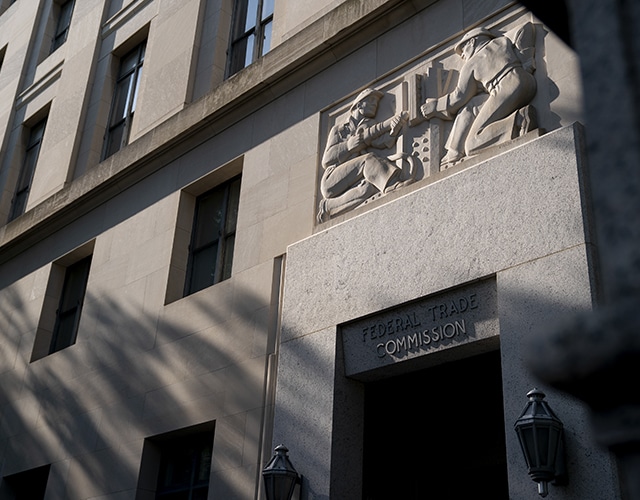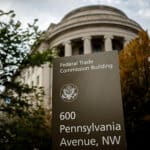The U.S. Chamber of Commerce fulfilled its promise to sue the Federal Trade Commission over a ban on agreements that prevent workers from leaving a company for a rival, arguing in a lawsuit that the agency overstepped its authority.
The lawsuit, filed April 24 in a U.S. District Court in Texas, argued that the FTC did not have authority to issue rules that define unlawful methods of competition. The Chamber of Commerce was joined by three other business groups: the Business Roundtable, the Texas Association of Business and the Longview Chamber of Commerce.
The suit came a day after the FTC announced a final rule to ban the noncompete agreements. The rule was approved in a 3-2 vote, with both Republican commissioners voting against the measure.
The Chamber of Commerce vowed to challenge the rule shortly after the vote. Its lawsuit called the ban “a vast overhaul of the national economy, and applies to a host of contracts that could not harm competition in any way.” It said the agency didn’t have the power to issue a ban and, even if it did, a categorical ban on such agreements wasn’t lawful.
Ryan LLC, a tax services firm in Dallas, also sued the FTC, generally raising similar arguments in a lawsuit filed in another U.S. District Court in Texas. Ryan is represented by Eugene Scalia, a partner at Gibson Dunn who was secretary of labor during the Trump administration.
Douglas Farrar, an FTC spokesperson, said in a statement that Congress empowered the agency to prevent “unfair methods of competition,” which it believes includes noncompete agreements.
“Our legal authority is crystal clear,” he said. “Addressing noncompetes that curtail Americans’ economic freedom is at the very heart of our mandate, and we look forward to winning in court.”
The choice of forums for the lawsuits puts the challenges in front of Trump-appointed District Court judges, J. Campbell Barker in the Eastern District and Ada Brown in the Northern District. Any appeal would be sent to the 5th U.S. Circuit Court of Appeals in New Orleans, where 12 of 17 judges were nominated by Republican presidents, with six by Trump.
Just the Beginning
Debbie Berman, a management-side lawyer at Jenner & Block, said the two lawsuits filed in Texas were just the beginning. She said the question of the FTC’s authority to ban noncompetes would probably come up in every lawsuit pertaining to such agreements going forward, and various courts were likely to reach different conclusions, making it ripe for the Supreme Court to weigh in.
“This court has certainly signaled that it views agencies’ powers to be narrow and very tightly hewed to the legislation that they’re promulgating rules and regulations from,” Berman said.
The FTC’s rule would void existing noncompete agreements, besides those applying to executives in “policymaking positions” who make at least $151,164 a year. It would also prevent companies from imposing new noncompetes, even on executives.
It is set to become law 120 days after it is published in the Federal Register, probably this week, although it may be tied up in a long legal battle.
The FTC has leaned on a 1973 appellate court decision — National Petroleum Refiners Association v. FTC — that allowed the agency to issue substantive rules. That case addressed the agency’s ability to require octane ratings be posted on gas pumps.
Uphill Battle?
William Kovacic, a former FTC chair, said the agency might face an uphill battle fending off the challenges to its rule on noncompetes.
“The FTC believes that earlier jurisprudence and legislation has created a bridge over which its noncompete rule can travel,” Kovacic said. “The hazard for the commission and its rule is that the bridge is fragile, and the FTC wants to drive a very heavy truck over it.”
The attempts to block the FTC’s noncompete rule come amid a broader pushback by some businesses, lawmakers and others against the power of executive agencies.
The Supreme Court is expected to decide by June on a case seeking a much more narrow interpretation of the powers federal agencies are granted. That case, like the ones against the FTC, seek to limit the agencies’ power to those explicitly granted by Congress.
Laura Padin, a lawyer at the National Employment Law Project, said a sympathetic Supreme Court had “emboldened” businesses to bring more challenges to agencies’ power. By arguing that every regulation should be explicitly ordered by Congress, which often deadlocks on legislation, business groups are essentially asking not to be subject to any new requirements, she said.
“What we’ve seen is this resurgence of corporations challenging the basic authority of administrative agencies to do their basic tasks,” Padin said.
c.2024 The New York Times Company. This article originally appeared in The New York Times.







